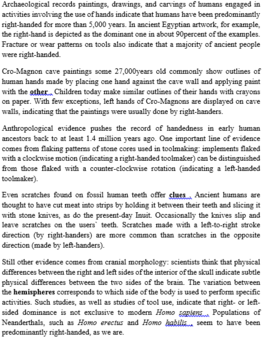Read the following passage and mark the letter A, B, C, or D on your answer sheet to indicate the correct answer to each of the following questions.
Fish that live on the sea bottom benefit by being flat and hugging the contours. There are two very different types of flatfish and they have evolved in very separate ways. The skates and rays, relatives of the sharks, have become flat in what might be called the obvious way. Their bodies have grown out sideways to form great “wings”. They look as though they have been flattened but have remained symmetrical and “the right way up”. Conversely, fish such as plaice, sole, and halibut have become flat in a different way. There are bony fish which have a marked tendency to be flattened in a vertical direction; they are much “taller” then they are wide. They use their whole, vertically flattened bodies as swimming surfaces, which undulate through the water as they move. Therefore, when their ancestors migrated to the seabed, they lay on one side than on their bellies. However, this raises the problem that one eye was always looking down into the sand and was effectively useless – In evolution this problem was solved by the lower eye “moving” around the other side. We see this process of moving around enacted in the development of every young bony flatfish. It starts life swimming near the surface, and is symmetrical and vertically flattened, but then the skull starts to grow in a strange asymmetrical twisted fashion, so that one eye, for instance the left, moves over the top of the head upwards, and old Picasso – like vision. Incidentally, some species of 20 flatfish settle on the right side, others on the left, and others on either side.
According to the passage, fish such as plaice _______.
A. have difficulties in swimming
B. live near C. have distorted headsthe surface
C. have distorted heads
D. have poor eyesight


Đáp án C.
Key words: plaice.
Phân tích:
A. have difficulties in swimming: gặp khó khăn trong bơi lội – Sai vì ngay ở câu đầu tiên ta đã biết đây là một loài được hưởng lợi nhờ việc thân nó trở nên dẹt (benefit by being flat) → nó bơi rất giỏi nhờ được hưởng lợi thế tiến hóa.
B. live near the surface: sống ở gần mặt nước – Sai vì ngay ở câu đầu tiên ta đã biết đây là một loài sống ở đáy biển (live on the sea bottom).
C. have distorted heads: có đầu méo mó – Đúng vì bài có đề cập đến việc hộp sọ của chúng bắt đầu phát triển theo một kiểu thời trang xoắn bất đối xứng. (the skull starts to grow in a strange asymmetrical twisted fashion)
D. have poor eyesight: có mắt kém – Sai vì trong bài chỉ nói nó hay nằm nghiêng, một con mắt lúc nào cũng nhìn xuống cát và bởi vậy cái mắt đó là vô dụng (one eye was always looking down into the sand and was effectively useless) → không phải là do mắt kém.
Vậy đáp án là C. have distorted heads